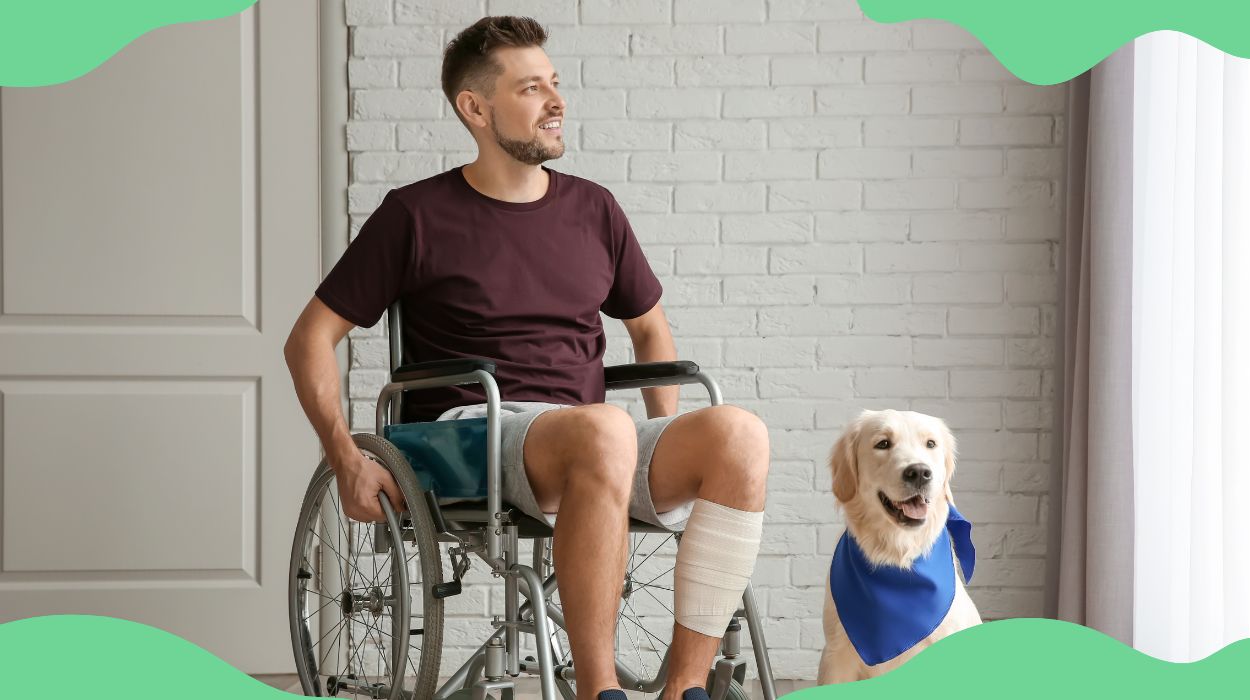 Expert's opinion
Expert's opinion
Expert's opinion
The article is a subjective view on this topic written by writers specializing in medical writing.
It may reflect on a personal journey surrounding struggles with an illness or medical condition, involve product comparisons, diet considerations, or other health-related opinions.
Although the view is entirely that of the writer, it is based on academic experiences and scientific research they have conducted; it is fact-checked by a team of degreed medical experts, and validated by sources attached to the article.
The numbers in parenthesis (1,2,3) will take you to clickable links to related scientific papers.
Emotional Support Dog Vs. Service Dog: 3 Differences

Dogs, man’s best friend. relieve emotional stress, anxiety, and pain while boosting mood and energy levels. Some have been trained to perform specific tasks for people with physical, emotional, or intellectual disabilities. These are emotional support dogs, therapy dogs, or service dogs.
Although emotional support dogs and service dogs are similar they have important differences. In this article, we outline the distinctions between these dogs in terms of legal rights, protections, training requirements, and the services they render.
Emotional Support Dog Vs. Service Dog: Differences
The key difference is training. Service dogs are specially trained to perform a task for an owner with a disability. Emotional support dogs require no training.
They also differ in their function. Service dogs carry out specific tasks to assist a person with a disability. In contrast, emotional support dogs only provide company and comfort.
Additionally, service animals have legal rights and protection not restricted to housing and travel, unlike emotional support dogs. Service dogs, through the Americans with Disabilities Act (ADA)[1], enjoy more benefits, such as legal access to enter anywhere.
Emotional Support Animals: What To Know?

Emotional support animals (ESAs) are not only pets. They provide emotional support to alleviate one or more symptoms of a person’s disability. They assist people with diagnosed mental health disorders such as anxiety, panic attacks, major depression, and post traumatic stress disorder (PTSD). ESA’s improve their owners’ psychological and social health by relieving symptoms such as pain, anxiety, stress, loneliness, and depression.
The Rights Of Emotional Support Animals
Emotional support animals do not have the same rights as service animals. ESAs’ rights are restricted to housing and air travel. Under the Fair Housing Act (FHA)[2], emotional support animals are allowed access only to residences, including those with no-pet or restrict-pet policies. Owners can live with their ESAs without facing discrimination from landlords and housing agents or having to pay pet fees.
Regarding air travel, only some airlines accept emotional support animals or psychiatric service animals on board. Airlines may request documentation that certifies the owner has a disability that requires the ESA with them. A mental health professional provides such documentation.
Training
Emotional support animals do not undergo any specialized training. While owners can enroll their ESAs in training classes and get them certified in certain areas, it is a required criterion.
Registration
By law, ESAs do not need to be registered. However, handlers may approach private companies for registration to get paperwork that may be submitted for official purposes. The Department of Justice does not recognize these documents and they do not convey additional rights or protection.
The only important documentation that is needed to access the rights of emotional support animals is a letter from a mental health professional that establishes your need. It can be requested by airlines, landlords, and businesses and workplaces.
Service Dog: Things To Remember

According to the Americans with Disabilities Act (ADA)[3], a service dog is trained to perform tasks for the benefit of a person with any type of disability. Service dogs are working animals and not pets. Hence, their training is related to the needs of their owner or handler.
Rights
Service animals are protected by multiple laws, such as the Americans with Disabilities Act (ADA), FHA, and Air Carrier Access Act (ACCA) for public access, housing, and air travel, respectively. Under the ADA[4], service dogs are given full public access and accompany people with disabilities to places like hospitals, stores, restaurants, hotels, schools, libraries, and public transportation.
According to the FHA[5], persons with disabilities who have service dogs should not be discriminated against when seeking accommodation. Service dogs should be granted access to housing facilities, including those with “no-pet” policies. Owners are exempt from paying pet fees or breed restrictions. Landlords may not ask a person with a service animal about their disability.
The ACAA[6] requires airlines to allow service animals to be in the cabin with their handlers. This, however, doesn’t cover “service animals in training.”
Training
Service dogs are expected to have undergone specialized training to perform one or more tasks for an individual with a disability. Their training should be directly related to the disability of the person they’ll be helping out.
Similarities Between Emotional Support And Service Dogs
Emotional support dogs and service dogs share a few similarities. They both help people with disabilities and are covered by the Fair Housing Act (FHA).
Three Differences Between Emotional Support And Service Dogs
Protection
Emotional support animals do not have the same legal protections as service animals. While the rights of emotional support dogs are restricted to housing and air travel (depending on the airline’s animal policy), service animals are protected by multiple laws and enjoy public access and full housing and air travel benefits.
Function
Service dogs are specially trained to carry out specific tasks to assist a person with a disability. Since there are a variety of disabilities, these service dogs receive specialized training. Emotional support dogs solely provide company and comfort by being present. Also known as companion dogs, they help relieve anxiety and depression-related symptoms.
Documentation
Landlords and housing providers cannot ask for documentation for a service dog. They can, however, request one for an emotional support animal. They can ask for a letter from a mental health professional to confirm your need for an emotional support dog.
Traveling With Emotional Support Dog & Service Dog
Different travel requirements apply to both types of dogs. Under the ADA, service dogs must be allowed in the cabin with their owners. Service dog owners do not have to present documentation before their dogs can be allowed into the aircraft with them. The new rules from the U.S. Department of Transportation[7], however, permit airlines to require forms that attest to a service dog’s health, behavior, and training.
Emotional support dogs may need supporting documentation at least 48 hours before the flight, depending on the airlines’ policies. These include Doctor’s Authorization, Vet Documentation, and Passenger Guarantee of Good Behavior. Some airlines might appreciate a heads-up, while others might require ESAs to travel under their general rules for pets. While on board, all animals are expected to be under their handler’s control.
What To Look For In An Emotional Support Animal

Emotional Support Animals can be of any species and are not limited to dogs. There are qualities you should look for in an animal before selecting it as your ESA. Generally, ESAs should have the following traits:
- Reliable and devoted to their handlers.
- Emotionally stable and calm.
- Obedient.
- Teachable and willing to learn.
- Intelligent.
- Friendly and easygoing.
- Social.
Considering getting an ESA? Here are a few tips on how to adopt an emotional support dog:
Take A Screening Test
A screening test to help diagnose what sort of mental health issue you may have. The Certapet website is an excellent resource for taking a free screening test (reviews on Certapet). Passing the Certapet ESA online screening qualifies you for the next step, which is speaking with a licensed therapist.
Consult With A Licensed Mental Health Professional
A licensed mental health professional must see that you need an emotional support dog to help with your treatment. Only then can they issue an ESA letter.
Get An ESA Letter
If you’ve been worried about how to get an ESA letter, there are third-party companies you can approach to get an ESA letter. You can check out our best legitimate ESA letter registration picks.
Adopt An Animal
If you already have a pet, you may make them your Emotional Support Animal. But if you don’t, you may go to shelters to adopt animals you feel will serve that purpose. This may be a rescue dog or a stray cat. Remember to look for the qualities stated above before choosing your ESA.
Conclusion
Emotional support animals (ESAs) and service animals are often confused. They both help people with disabilities, however, they have key differences between them. Service dogs undergo special training to perform specific tasks for certain needs of people with disabilities. They also enjoy certain legal protections that emotional dogs do not.
Frequently Asked Questions
No. However, you can make your pet your ESA by consulting with and having a letter issued by a licensed mental health professional to establish the need for an ESA.
No. ESAs are not service animals because they do not perform specific day-to-day tasks for individuals with disabilities. They only provide comfort and emotional support.
Psychiatric Service Dog (PSD) is a type of service dog that performs specific tasks for the benefit of a person with a mental disability. An example is an obsessive-compulsive disorder (OCD) service dog that helps keep owners present and calm. ESAs are animals whose mere presence provides comfort and companionship to a person with a mental disability.
No. These groups of animals are not specially trained to perform a specific task directly related to a disability, hence, they do not qualify as service animals under ADA.
Yes. Persons with disabilities have the right to train their dogs themselves. Service animals are not required to undergo professional training.
No. The ADA does not require service animals to be certified or that they need documentation to prove their status or abilities.
Yes. If unclear, you may clarify by asking just two questions: Is the dog required because of a disability? What work or task has the dog been trained to perform? However, you are not allowed to request documentation, request that the dog demonstrate its task, or ask for details about the person’s disability.
If the state and local laws request that all dogs be licensed, you must get your service dog licensed.
+ 7 sources
Health Canal avoids using tertiary references. We have strict sourcing guidelines and rely on peer-reviewed studies, academic researches from medical associations and institutions. To ensure the accuracy of articles in Health Canal, you can read more about the editorial process here
- Adata.org. (2023). Service Animals and Emotional Support Animals | ADA National Network. [online] Available at: https://adata.org/guide/service-animals-and-emotional-support-animals
- The Humane Society of the United States. (2023). The Fair Housing Act and assistance animals. [online] Available at: https://www.humanesociety.org/resources/fair-housing-act-and-assistance-animals
- ADA.gov. (2023). ADA Requirements: Service Animals. [online] Available at: https://www.ada.gov/resources/service-animals-2010-requirements/
- ADA.gov. (2023). ADA Requirements: Service Animals. [online] Available at: https://www.ada.gov/resources/service-animals-2010-requirements/
- Adata.org. (2023). Service Animals and Emotional Support Animals | ADA National Network. [online] Available at: https://adata.org/guide/service-animals-and-emotional-support-animals
- Adata.org. (2023). Service Animals and Emotional Support Animals | ADA National Network. [online] Available at: https://adata.org/guide/service-animals-and-emotional-support-animals
- Transportation.gov. (2020). U.S. Department of Transportation Announces Final Rule on Traveling by Air with Service Animals | US Department of Transportation. [online] Available at: https://www.transportation.gov/briefing-room/us-department-transportation-announces-final-rule-traveling-air-service-animals



